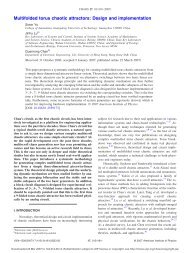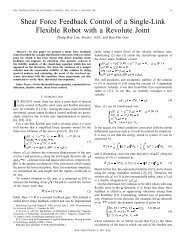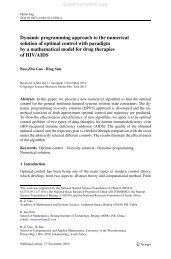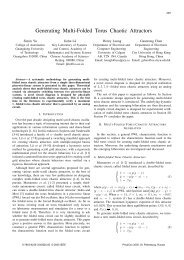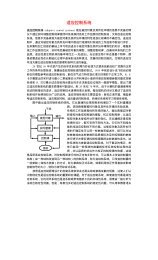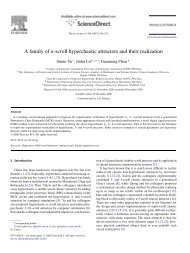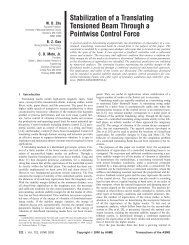Conference Program of WCICA 2012
Conference Program of WCICA 2012
Conference Program of WCICA 2012
You also want an ePaper? Increase the reach of your titles
YUMPU automatically turns print PDFs into web optimized ePapers that Google loves.
<strong>WCICA</strong> <strong>2012</strong><br />
Pre-conference Workshops<br />
Workshop V<br />
9:00-16:30, Thursday, July 5, <strong>2012</strong><br />
Room 206, Postgraduate Building, Beijing Institute <strong>of</strong> Technology<br />
Unmanned Rotorcraft Systems<br />
Chair: Ben M. Chen, National University <strong>of</strong> Singapore, Singapore<br />
Abstract<br />
In recent years, research and development <strong>of</strong> unmanned systems have gained much attention in the<br />
academic and military communities worldwide. Topics like unmanned aircraft, underwater explorers, satellites,<br />
and intelligent robotics are widely investigated as they have potential applications in the military and<br />
civilian domains. They are developed to be capable <strong>of</strong> working autonomously without the interference <strong>of</strong><br />
a human pilot. The challenge is that they need to deal with various situations that arise in very complicated<br />
and uncertain environments, such as unexpected obstacles, enemies attacking and device failures.<br />
Besides, they are required to communicate with technical personnel in the ground station. Consideration<br />
<strong>of</strong> a wide range <strong>of</strong> factors needs to be taken. Control systems for the unmanned vehicles are required<br />
to integrate not only basic input-output control laws but also high-level functionalities for decision making<br />
and task scheduling. S<strong>of</strong>tware systems for unmanned vehicles are required to perform tasks from<br />
hardware driving to the management <strong>of</strong> device operations, and from traditional input-output control law<br />
implementation to task scheduling and event management.<br />
The proposed workshop aims to explore the research and development <strong>of</strong> fully functional miniature<br />
rotorcraft unmanned aerial vehicles (UAV), and provides a complete treatment <strong>of</strong> their design. The unmanned<br />
system is an integration <strong>of</strong> advanced technologies developed in communications, computing, and<br />
control areas. It is a useful testing ground for trialing and implementing modern control techniques despite<br />
the challenges introduced by the limitations on direct scalability between the systems <strong>of</strong> a small-scale rotorcraft<br />
and those <strong>of</strong> its full scale counterpart. In this workshop, we intend to cover all the relevant topics<br />
related to fully-functional UAVs, which include hardware platform construction, real-time s<strong>of</strong>tware system<br />
integration, ground control s<strong>of</strong>tware systems, aerodynamic modeling, automatic flight control, flight formation<br />
<strong>of</strong> multiple UAVs, and vision-based tracking and navigation systems. Topics on the development <strong>of</strong><br />
micro aerial vehicles, and navigation systems for indoor and outdoor cluttered environments will also be<br />
highlighted.<br />
It is a full day workshop with a total <strong>of</strong> 5 to 6 lecturing hours.<br />
Description <strong>of</strong> Workshop<br />
Lecture: Ben M. Chen, Guowei Cai, Feng Lin, Xiangxu Dong, National University <strong>of</strong> Singapore<br />
Biao Wang, Nanjing University <strong>of</strong> Aeronautics and Astronautics<br />
List <strong>of</strong> topics:<br />
∙ Introduction to unmanned system<br />
∙ Systematic UAV platform construction<br />
∙ S<strong>of</strong>tware systems integration<br />
∙ Aerodynamic modeling<br />
∙ Automatic flight control system design<br />
∙ Flight formation <strong>of</strong> multiple UAVs<br />
∙ Vision-based tracking and navigation<br />
37



